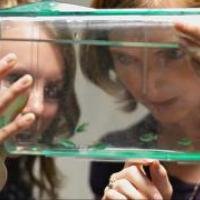News & Announcements
Robert Vass PhD Dissertation Defense
Robert Vass PhD Dissertation Defense
Monday, November 20, 2017
1:00 PM
Life Sciences Laboratory, Room N410
Dissertation Title: CLPXP Functions in Caulobacter as a Universal and Species Specific Protease
Advisor: Peter Chien
Payal Damani-Yokota PhD Dissertation Defense
Payal Damani-Yokota PhD Dissertation Defense
Friday, November 17, 2017
12:15 PM
French Hall, Room 209
Dissertation Title: Regulation of expression of the gamma delta T cell co-receptor and pattern recognition receptor multi-gene family WC1
Advisor: Cynthia Baldwin
Edwin Murenzi receives Best Graduate Poster Award at the NACSETAC 2017 annual meeting
Edwin Murenzi receives Best Graduate Poster Award at the NACSETAC 2017 annual meeting
Edwin Murenzi's poster, "PYRETHROIDS INCREASE TETRODOTOXIN-SENSITIVE SODIUM CURRENTS EXPRESSED IN RAT BRAIN TISSUE MICROTRANSPLANTED INTO XENOPUS LAEVIS OOCYTES" was recognized as the Best Graduate Poster at the 23rd annual North Atlantic Chapter of the Society of Environmental Toxicology and Chemistry Meeting. Edwin's bio / Meeting abstracts
Timme-Laragy Investigating Pollutant Effects on Embryos in Three Model Species
Timme-Laragy Investigating Pollutant Effects on Embryos in Three Model Species
Environmental health scientist Alicia Timme-Laragy recently received a $1.9 million grant from the National Institute of Environmental Health Sciences to study the health effects of two environmental pollutants, perfluoro-octanesulfonic acid (PFOS) and its recent replacement chemical, perfluoro-butanesulfonic (PFBS). Read more
Microbiologists Contribute a Step Toward Possible New Anti-TB Treatment Path
Microbiologists Contribute a Step Toward Possible New Anti-TB Treatment Path
As part of the long effort to improve treatment of tuberculosis (TB), microbiologists led by Yasu Morita report that they have for the first time characterized a protein involved in making a glycolipid compound found in the TB cell wall, which is critical for the disease-causing Mycobacterium to become infectious. Read more
Researchers Receive $2.4 Million to Study Exercise Responses in Older Men and Women
Researchers Receive $2.4 Million to Study Exercise Responses in Older Men and Women
Kinesiologist Mark Miller and colleagues have received a five-year, $2.4 million grant from the National Institutes of Health to examine two distinct exercise training regimes designed to improve skeletal muscle function in older men and women, and in particular to determine whether the neuromuscular systems in each sex may respond differently to the training programs. Read more
Sela featured in article about live-culture foods
Sela featured in article about live-culture foods
David Sela, Food Science, was interviewed for an article about why live-culture foods are popular with health food advocates, noting that what we eat not only nourishes us but also feeds the beneficial bacteria—the microbiome—in our intestines. Valley Advocate
Petersen presents work on predicting PhD attainment
Petersen presents work on predicting PhD attainment
Sandra Petersen, Veterinary & Animal Sciences and director of the Northeast Alliance for Graduate Education and the Professoriate, presented a workshop at the Institute on Teaching and Mentoring on Oct. 27 in Atlanta. Her workshop, “Predicting PhD Attainment: The Efficacy of the GRE,” focused on results of a recent study of 2,000 STEM PhD students in four NEAGEP flagship state universities. Read more
Serio and fellow researchers consider ways to improve postdoc training
Serio and fellow researchers consider ways to improve postdoc training
CNS Dean Tricia Serio and a group of colleagues from other institutions published an article in eLife that considers the future of research, proposing that improving the postdoctoral training experience could be a way to address problems in the sustainability of biomedical research. To optimize the biomedical research workforce, they write, “we need to determine how best to support researchers at each level of their career, including faculty, staff scientists and trainees at all levels.” Read more
Siegrist receives $2.3 million NIH grant for TB research
Siegrist receives $2.3 million NIH grant for TB research
Sloan Siegrist, Microbiology, has received a five-year, $2.3 million National Institutes of Health (NIH) New Innovator Award, which supports “unusually innovative research from early career investigators.” She will use the award to study the bacterium that causes tuberculosis (TB), with a focus on understanding the behavior of antibiotics that kill the disease to shorten TB therapy. Read more.






